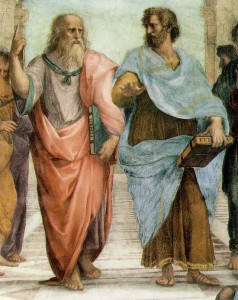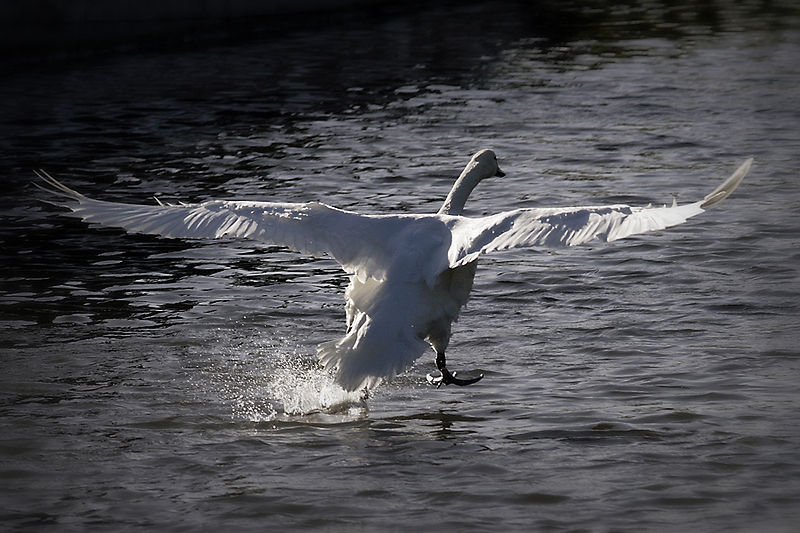‘”The part which relies on measurement and calculation must be the best part of us…. So is not the part which contradicts them an inferior one?”
“Inevitably”‘ (Plato’s Republic, 603a)
Thus does Plato provide the basic rationale for his condemnation of poetry, along with the other arts. He says that the works of the poet, like those of the artist, have “a low degree of truth” and “he deals with a low element of the mind”. “We are therefore quite right to refuse to admit him to a properly run state” continues Socrates, in pronouncements that are only echoed and accepted by others in the dialogue. Thus begins the long quarrel between philosophy and poetry.
It is easy to see this quarrel as reflecting that between those who judge solely on the basis of the representations of the left brain hemisphere at a particular time, and those who, using the right hemisphere, want to look beyond such certainties and integrate the contents of the left hemisphere at different times. Plato, through the mouthpiece of his dramatised Socrates, appears to reflect that left brain certainty: that rightness dwells only in the apparent clarity of our current representation, and in its tools of positive measurement, critical analysis, and planning. Humour, ambiguity, and grief should not be publicly shared in art, he says, but rather repressed and made objects of shame, made subject to the control of ‘reason’.
Fortunately, Plato’s ideal Republic of the left brain was never created in the fashion he envisaged it. However, he has had many imitators, particularly in the shape of political revolutionaries of a kind who wished to purge the world of all untidy ambiguity that did not fit their utopian vision. Rather than keeping them out of the Republic entirely, the Fascist and Communist regimes of the twentieth century subjected poets and other artists to censorship and control, so that they could only publicly express what fitted the party line.
Plato attacked poetry because he believed it was a form of rhetoric, which would stir up and manipulate uncontrolled emotions, but ironically it is philosophy that has too often become allied to rhetoric by offering naïve political schemes or supporting conventional views of the world, at odds with the immediacy of poetry. It is the poets who have generally understood rather better that meaning resides, not in representations, but in embodied experience. Language that does not speak to that experience appeals only to the shared lowest common denominator of human experience. Without poetry we are too often left to the clichés of the crowd and its groupthink, unable to summon creative responses to new conditions because the very tools of our thinking have been blunted by the platitudes of conventional certainty.
I have recently come across a quotation from the great Irish poet W.B. Yeats that gives wonderful expression to this poetic counter-attack:
“Ideas and images which have to be understood and loved by large numbers of people, must appeal to no rich personal experience, no patience of study, no delicacy of sense…. Manner and matter will be rhetorical, conventional, sentimental; and language, because it is carried beyond life perpetually, will be as wasted as the thought, with unmeaning pedantries and silences, and a dread of all that has salt and savour.” (from J.M.Synge and the Ireland of his time, 1910, quoted recently in a TLS article by Roy Foster)
Of course, philosophy is a varied thing, but if modern philosophy has a consistent theme (with only a few exceptions) it is the overwhelming dominance of limited, ‘flat’ left hemisphere thought in which the wider use of thinking in experience is completely ignored. In the case of Anglo-Saxon philosophy, it may be precise, analytic and highly technical, but nevertheless have the effect only of reinforcing conventional attitudes, or (in the case of post-modernism) it may be highly critical of all conventions, but again in a decontextualized way that gives no attention to the depth or breadth of experience or the practical context in which it is read. Whilst this kind of philosophy may seem of marginal interest to most people in modern society, that marginality might be seen as the unintended and ironic outcome of Plato’s approach. By relying entirely on an inadequate conception of ‘reason’, philosophy has made itself marginal. However, the conventionality, parochialism, cynicism and relativism that dominate it are shared with much of the rest of society.
Has either side ‘won’ the debate? On the one hand it seems that philosophy has ‘won’ in the sense that poetry is extremely marginal in our society, and superficial representationalism rules supreme. On the other hand, however, it seems that poetry has ‘won’, because it has not been banished from the state, and every new generation finds new ways of connecting with the imagination, however puritanical the public discourse. It is, of course, an unwinnable war and a delusory conflict, because both philosophy and poetry address central areas of human experience. Every time we machine-gun down the ‘opposition’, it is likely to pop up again, like an army of indestructible revenants.
It’s time for a new attempt at lasting peace negotiations. Part of a lasting solution, in my view, involves the deconstruction of the wrong assumptions on which the whole conflict has been based. No helpful philosophy can be assembled on the basis of a representational view of meaning that denies the body and its shaping effect on even the most abstract of our constructions. But if we begin with this recognition and face up to its revolutionary implications, philosophy can be shaped anew in a way that works in co-operation and peace with poetry. Metaphor is the way in which we appreciate meaning and connect it to bodily experience, not a dispensible ornament on a ‘literal’ base. Beliefs constructed on the assumption that they are even capable of reflecting reality become dogmatic, entrench us in inadequate attitudes, and create conflict. ‘Emotion’ is part of our basic response to the world, and is not ‘subjective’ and ripe for repression, but rather, like ‘reason’, part of our provisional account of the world, to be shaped with increasing adequacy.
Poets have been telling us about the power of metaphor and the need to face up to repressed ’emotion’, for thousands of years. Now it’s time to start listening, and to incorporate that view into a richer and more adequate kind of philosophy. I will close with a quote from Seamus Heaney (who died a year ago), which I also found in the same TLS article as the one from Yeats above:
“Within our individual selves we can reconcile two orders of knowledge which we might call the practical and the poetic…. each form of knowledge addresses the other and… the frontier between them is there for the crossing.”

